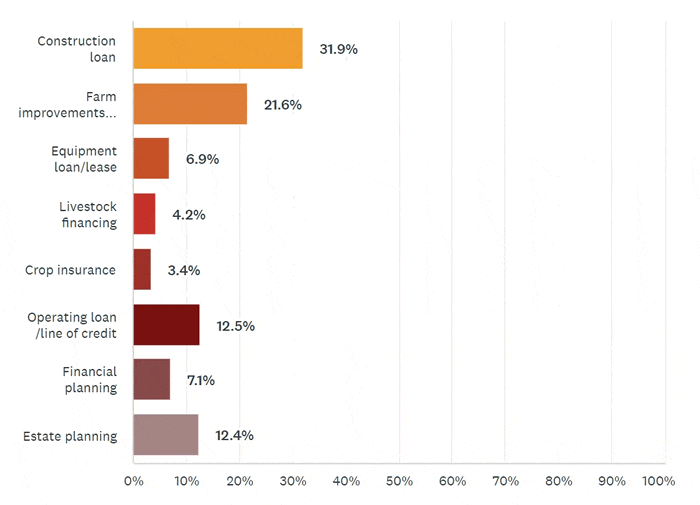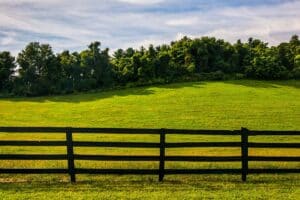Last month, the LANDTHINK Pulse posed the following question to our audience: Which financial product would you likely need most following a land purchase?
Our informal online survey revealed that 31.9% of respondents would most likely obtain a home construction loan after purchasing land for sale. The results were not surprising, however. Early last year, the LANDTHINK Pulse asked our audience: What is (would be) your primary purpose for purchasing land? That month’s survey question revealed that their main goal in purchasing land was to build a home and live on the property.
September Pulse Sponsored by
With a shortage of homes on the market and the pandemic making people rethink where they want to live, buying rural land and building a home is enticing. As long as your budget allows it, you can choose the floor plan and finishes you prefer. Plus, everything is brand new. At the end of the process, you have a truly special place to live, something uniquely yours.
Beyond what you envision your custom built home to look like, you need to find out if you can get a construction loan to build a house, how the loan works, how much money you will need to put down for the loan, and more. Building a home on your own land is significantly different from buying an existing home with a standard mortgage.
A construction loan is a short-term loan that gives you the funds needed to build a house on a piece of land or renovate a home during the construction period. The loan is used to cover nearly everything that goes into building a home: land, labor, permits and building materials. Because they are considered a financial risk to the lender, construction loans typically have higher interest rates. The lender pays the funds to the contractor, rather than the borrower. These payments (or draws) come in installments at different stages in the process, rather than all at once.
There a quite a few different types of constructions loans that you may encounter:
Construction-only loan. These funds would be used strictly for the construction of a property. The borrower will usually make interest-only payments until it’s complete. The principal balance is commonly due in full once the project is complete, or one year later. This type of loan will not convert to a traditional mortgage. Borrowers will need to pay the balance in full when construction is completed, or refinance to a new loan that pays off the construction loan.
Construction-to-permanent loan. With this type of loan, the buyer takes out a loan from the lender that’s essentially a line-of-credit, and the builder can draw from it at each stage of construction. There are on-site inspections at the various draw stages. This type of loan will provide the borrower with the funds to build a house and finance their mortgage as well. At the end of the draw period, the loan converts to a traditional mortgage.
VA construction loan. As with any Veterans Administration loan, the borrower must be a qualifying active duty member of the U.S. military, veteran, or surviving spouse. A Certificate of Eligibility (COE) is usually required. This is a one-time close loan. The simplified loan program allows them to finance the construction, land/lot purchase, and permanent mortgage, all with a single loan.
FHA construction loan. These loans are backed by the Federal Housing Administration and offer a one-time close construction-to-permanent loan. Borrowers can qualify with a credit score as low as 500 and a down payment as low as 3.5 percent. The loan covers expenses including the purchase of land, building materials, construction work and permitting fees.
Owner-builder construction loans. If you happen to be a licensed builder, you have the option of obtaining an owner-builder construction loan and supervising the construction of your home yourself.
Hard money construction loan. Hard money construction loans are secured by the property. They often charge higher interest rate than other options, and the lender is going to require that you invest your own capital into the project. These loans are an excellent alternative for developers who require funds to get the project started and might not be a good candidate for a traditional loan.
No matter which loan type you ultimately choose, the lender will work closely with you and the contractor throughout the construction loan process. The lender will make sure that construction is progressing as it should, that it’s being built with quality, and that it meets code and all other required standards.
Delays in the construction process can occur for a number of reasons, including the weather and the fact that materials are currently in short supply. The borrower and the lender need to carefully consider the timeline, processes, additional fees, and potential delays. Many projects go over budget and borrowers need to have extra funds set aside. Loans often have a built-in contingency of 5% to 10% over the estimated cost, but you may need documentation in the form of a change order.
As with any loan, the borrower should clearly understand what a construction loan entails, consider carefully the terms of the loan and its impact on your finances.

Coming in a close second, 21.6% said that after making a land purchase, they would most likely seek a loan for farm improvements. Whether you own a mini farm, micro-farm, or a large scale agriculture business, making capital improvements can help boost your farm’s value, become more efficient, and improve your products. Farm improvements can range from simply adding fencing, to pond and driveway construction, to center pivot and drip irrigation systems, or to help conserve and protect soil and water resources.
Farm Credit institutions are a good source for farm improvement loans. They know what it takes to succeed in the agricultural industry and can help farm owners reach their agricultural goals. Obtaining a farm improvement loan can help you fund the essential aspects of your farm to continue to operate a successful business.
LANDTHINK would like to thank AgCarolina Farm Credit for sponsoring the September Pulse and for choosing a very interesting question to pose to our audience. North Carolina farmers and rural residents can qualify for loans for farms, homes, agribusinesses and more from one of the three Farm Credit of North Carolina associations in the state. Farm Credit of North Carolina is part of the Farm Credit System, which has been serving the credit needs of rural America for 100 years. Their loan officers live in the area they serve, and are an active part of their rural communities. Farm Credit of North Carolina knows farming and agribusiness best because their loan officers and directors are local farmers, who understand you need a lender that will stand by your side. For information about loans, services, and more, contact a relationship lender that services your area.
Become a Pulse sponsor! It’s a great way to ensure your brokerage is the first one buyers and sellers call when they have a need to buy or sell property. You’ll get insane exposure on Social + Email + Web. That’s 500,000+ monthly eyes on you! Once you have it, you won’t want to give it up! Pulse sponsorships are offered on a first come first served basis and are subject to certain limitations. If your business is interested in becoming a Pulse sponsor or you want to suggest a question for the Pulse, please contact us.
This content may not be used or reproduced in any manner whatsoever, in part or in whole, without written permission of LANDTHINK. Use of this content without permission is a violation of federal copyright law. The articles, posts, comments, opinions and information provided by LANDTHINK are for informational and research purposes only and DOES NOT substitute or coincide with the advice of an attorney, accountant, real estate broker or any other licensed real estate professional. LANDTHINK strongly advises visitors and readers to seek their own professional guidance and advice related to buying, investing in or selling real estate.











Add Comment